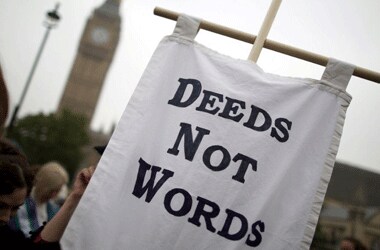I answered yes to most, if not all, of my colleague Ayeshea’s quiz for men , but I still don’t call myself a feminist. In part this is a semantic quibble: feminism, to the extent it emphasises the femine in the androgynous human being, can only be a half-way house to humanism. Women’s rights emerge from the fundamental human rights we are all entitled to. There is no female source for it. Hence, feminism, for me is a limiting idea. It is useful to mention it till women achieve equality and feel empowered enough to abandon it. After a while it will be a drag, for the idea is exclusive. Consider this: if feminism is a valid idea, masculinism (as different from patriarchy) has to be too valid too. How many women would like to call themselves masculinists? [caption id=“attachment_653324” align=“alignleft” width=“380”]  Agencies.[/caption] Of course, we haven’t heard of anything called masculinism, but, like feminism, it can also be defined as a statement of male empowerment and responsibility to observe human values. The truth is male and female are not polar opposites. It is a continuum, as every human being is androgynous, embodying qualities that we identify (culturally) as female or male, never mind the plumbing of our bodies. An individual may have more female qualities or more male, but ultimately we are a mix of the two. In fact, Lise Eliot, author or Pink Brain, Blue Brain: How Small Differences Grow Into Troublesome Gaps – And What We Can Do About It, says that the actual differences in biology and masculine-feminine traits are so small at birth that if both boys and girls are brought up the same way, without culturally-induced differentiated treatment, we wouldn’t know the difference (assuming they were dressed to confuse us). So when we try to define ourselves as male or female, we are only trying to differentiate on the basis of our external physical attributes, or by culturally-induced norms of what it means to be a male or female. The androgynous human has to define herself/himself (or just self) in terms of broader human values, and not values that appear specific to one gender. In this context, to call oneself feminist is self-limiting, not only for men, but also women. The problem with patriarchy is not merely that it demeans women, but it demeans men too. It has separated men from the other half of their selves, their psyches, their feminine sides - just as discrimination has force-fitted women into narrow confining roles and responsibilities. Men have, in a sense, been culturally lobotomised from their own other selves. The real damage men have caused in the long reign of patriarchy is that they have not only denied women their due, but have also denied themselves the values of being human - and the truth. Culture and scriptures have lied to all of us by giving primacy to men - as the story of Eve being allegedly created from the ribs of Adam suggests. But biology suggests the opposite: that the basic template of the human being may be female. It is the injection of testosterone during early pregnancy that makes the embryo male of female, apart from the X or Y chromosome bit. True equality needs us all - men and women - to acknowledge our humanity and androgyny. There is no harm in women calling themselves feminists, for this is a staging post on their road to true equality, but the ultimate destination is humanism - the source of all our values. This is why I would not call myself a feminist.
It is humanism that will matter ultimately, not feminism.
Advertisement
End of Article
Written by R Jagannathan
R Jagannathan is the Editor-in-Chief of Firstpost. see more


)
)
)
)
)
)
)
)
)



